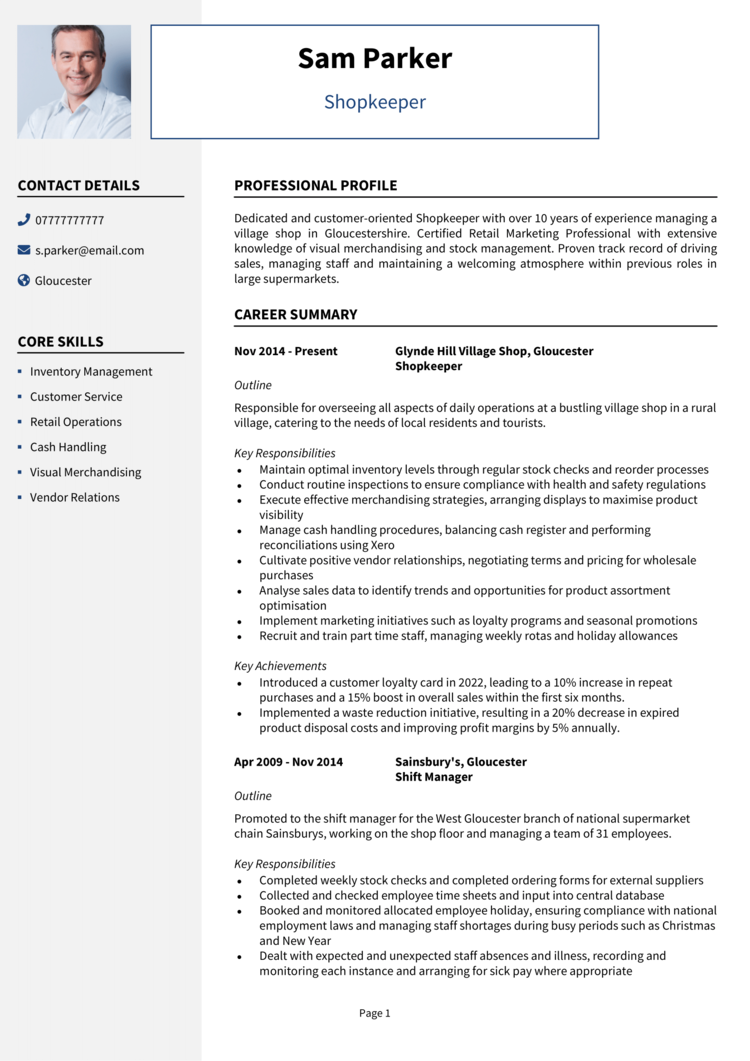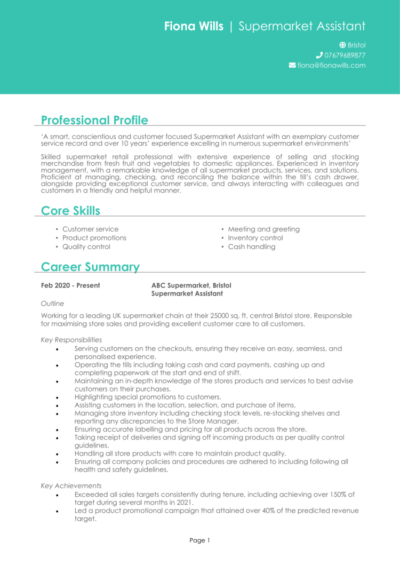A supermarket doesn’t run itself – it takes hardworking staff to keep the shelves stocked, the checkouts moving, and customers happy. Whether you’re helping shoppers find what they need, working behind the till, or managing deliveries, every role plays a vital part in keeping things running smoothly.
These Supermarket example CVs and writing guide will show you how to produce a strong supermarket CV that highlights to recruiters your ability to keep up with the demands of the job, whether you’re applying for a cashier position, a stockroom role, or a supervisory position.
Supermarket Assistant CV

Shopkeeper CV

Supermarket Manager CV

How to write your Supermarket CV
Learn how to create your own interview-winning Supermarket CV with this simple step-by-step guide.
Just like a good store layout makes shopping easier, a well-structured CV makes a recruiter’s job simpler. They should be able to find the key details without needing to ‘ask a member of staff’ for help.
By the end of this guide, you’ll have a CV that shows you’re ready to handle anything, from long queues to last-minute shifts.
Supermarket CV structure


Supermarket employers don’t have time to dig through an untidy CV structure – if they wanted a challenge, they’d be tracking down the last pack of toilet rolls during a panic buy. A clear and logical layout will help hiring managers find what they need quickly.
Here’s how to structure your CV:
- Name and contact details – Keep your contact details at the top so employers can reach you easily: a photo is always optional.
- Profile – Kick off with a strong opening that highlights your experience, reliability, and customer service skills.
- Core skills – Give the recruiter a list of relevant abilities, such as teamwork, efficiency, and working under pressure.
- Work experience – Detail your previous roles in reverse chronological order, focusing on your key contributions.
- Education – Show off your qualifications, from GCSEs and degrees to training and certifications, starting with the most recent.
- Additional info – Optionally, outline any extra hobbies, interests, and awards that’ll help boost your application.
How to format your Supermarket CV


In a busy store, everything needs to be well-organised – and your CV format is no different. If you’re writing your CV in a way that’s cluttered or difficult to read, hiring managers might assume your approach to work is the same.
Make full use of these formatting tips:
- Bullet points – Use them to highlight your responsibilities and achievements clearly.
- Divide sections – Keep each section well-structured for easy navigation.
- Use a clear and readable font – Choose a professional and simple font for readability.
- No more than 2 pages – Keep it concise. If your CV is longer than a supermarket receipt after a weekly shop, it’s time to trim it down.
Supermarket CV profile


Your CV profile is like the best in-store promotion – it should grab attention and make employers want to know more. This short section at the top of your CV should summarise your experience, skills, and reliability in a way that really conveys to prospective employers the value they’d get from hiring you.
If you’re just entering the retail field and you’ve got less experience, you should opt for a longer, more comprehensive personal statement, potentially alongside a tailored cover letter.
Supermarket CV profile examples
Profile 1
Hardworking Supermarket Assistant with two years of experience in customer service, stock replenishment, and checkout operations. Skilled in handling cash transactions, assisting customers, and ensuring shelves are well-stocked and organised. Adept at working in fast-paced retail environments while maintaining high service standards.
Profile 2
Reliable Supermarket Team Member with one year of experience in food retail, focusing on stock rotation, merchandising, and assisting customers. Proficient in using POS systems, handling deliveries, and ensuring compliance with food safety regulations. Committed to providing excellent customer service and maintaining a clean, organised shopping environment.
Profile 3
Experienced Supermarket Supervisor with over five years of expertise in managing store operations, training staff, and ensuring smooth daily workflows. Skilled in inventory management, sales reporting, and customer service. Dedicated to improving team efficiency and maintaining high store standards to enhance the shopping experience.
What to include in your Supermarket CV profile
To create a strong profile, include:
- Your supermarket experience – Whether you’ve worked as a cashier, stock assistant, or supervisor, make it clear.
- Key strengths – Highlight skills such as efficiency, attention to detail, and customer service.
- Ability to work under pressure – Supermarkets can get busy – show that you can handle peak hours.
- Teamwork and adaptability – Whether you’re supporting colleagues or helping customers, flexibility is key.
- Technical or practical skills – If you’re trained in till operation, stock management, or food safety, mention it here.
How to highlight your core skills


A core skills section gives recruiters a quick way to see what you bring to the role at a glance. Since supermarket roles can vary from checkout assistant to stock replenisher to team leader, tailoring this section to the specific job you’re applying for is key.
Think about what makes you a strong candidate – are you great with customers, efficient under pressure, or skilled at handling deliveries? Highlight the strengths that match the role.
For example, if you’re applying for a cashier role, accuracy and customer service will be key. If you’re going for a stockroom job, efficiency and organisation should take priority.
The more aligned your CV skills are with the job description, the stronger your CV will be.
The top skills to highlight in your Supermarket CV
- Customer Service – Assisting shoppers with inquiries, product recommendations, and problem resolution to enhance their experience.
- Cash Handling and POS Operation – Processing transactions accurately using point-of-sale (POS) systems, handling cash, and managing digital payments.
- Stock Replenishment – Restocking shelves, rotating products, and ensuring items are displayed neatly and correctly.
- Inventory Management – Monitoring stock levels, conducting stock checks, and reporting shortages to prevent supply issues.
- Merchandising and Display – Arranging products attractively to maximise sales and ensure a well-organised shopping environment.
- Health and Safety Compliance – Adhering to food hygiene, workplace safety, and store regulations to maintain a safe environment.
- Warehouse and Storage Handling – Managing deliveries, organising stockrooms, and ensuring efficient storage.
- Loss Prevention Awareness – Identifying and preventing theft, fraud, and inventory shrinkage through vigilance and security practices.
- Product Knowledge – Understanding product categories, promotions, and discounts to assist customers effectively.
- Teamwork and Collaboration – Working efficiently with colleagues to ensure smooth daily operations and excellent customer service.
Work experience


Hiring managers want to see more than just job titles – they want proof that you can handle the responsibilities of the role. Your work experience section should show how you’ve contributed in previous jobs, whether that’s by providing great customer service, keeping shelves stocked, or ensuring smooth store operations.
List your roles in reverse chronological order, highlighting your impact in each position. If you don’t have supermarket experience, focus on transferable skills from other jobs, school projects, or volunteer work.
How to structure jobs

- Outline – Introduce the store or company and your role within the team.
- Responsibilities – Describe your main tasks, such as assisting customers, operating checkouts, or managing stock. Use power words like “processed”, “restocked”, and “assisted”.
- Achievements – Highlight measurable successes, such as reducing queue times, improving stock organisation, or receiving positive customer feedback.
Example jobs for Supermarket roles
Supermarket Assistant | Freshmart Grocery
Outline
Provided excellent customer service within a national supermarket chain, assisting with stock management, checkout duties, and maintaining store cleanliness to ensure smooth daily operations.
Responsibilities
- Operated tills and handled cash and card transactions with accuracy.
- Restocked shelves and maintained product displays to ensure availability.
- Assisted customers with product inquiries and provided excellent service.
- Managed stock rotation, checking expiry dates to minimise waste.
- Kept the store clean and organised to meet health and safety standards.
Achievements
- Increased checkout efficiency by reducing average wait times by 20 percent.
- Recognised by management for excellent customer service and teamwork.
- Helped reduce stock wastage by implementing better stock rotation practices.
Supermarket Assistant | ValueGrocers
Outline
Ensured shelves were fully stocked and correctly labelled within a busy grocery retailer, maintaining a well-organised shopping environment and assisting customers with product inquiries.
Responsibilities
- Unloaded deliveries and replenished stock efficiently during shifts.
- Checked product dates and rotated stock to maintain freshness and reduce waste.
- Ensured aisles were tidy and clear of hazards to provide a safe shopping experience.
- Assisted in setting up promotional displays and price changes.
- Supported other departments during peak shopping hours.
Achievements
- Helped improve stock availability by restocking 30 percent faster than target times.
- Reduced expired stock waste by 15 percent through proactive rotation.
- Received positive customer feedback for assisting with product inquiries.
Supermarket Supervisor | Metro SuperStore
Outline
Supervised daily operations within a regional supermarket chain, overseeing team performance, coordinating stock replenishment, and ensuring high levels of customer service across all store departments.
Responsibilities
- Managed and trained a team of supermarket assistants to meet store targets.
- Monitored stock levels and coordinated with suppliers to maintain inventory.
- Handled customer complaints and resolved issues promptly.
- Oversaw cash handling and till operations to ensure accurate financial reporting.
- Ensured compliance with food safety and health regulations.
Achievements
- Increased team efficiency by introducing a new stock replenishment system.
- Reduced customer complaints by 25 percent by improving staff training.
- Achieved record-high store sales during peak seasonal periods.
What’s the best way to write an education section?


While experience is often more important for supermarket roles, your education section should still be structured clearly. If you’re applying for your first job, highlight relevant subjects or coursework that demonstrate key skills like teamwork or communication.
List qualifications in reverse chronological order, starting with your most recent.
Key qualifications for Supermarket roles
- Food Hygiene Certificate (if applicable) – Important for roles involving fresh food handling.
- Customer Service Qualification (NVQ or BTEC) – Demonstrates skills in handling customer interactions.
- Health and Safety Training – Useful for warehouse or stockroom positions.
- Retail Operations Certificate – Covers the basics of working in a store environment.
- First Aid at Work Certification – Some employers value staff who are trained in first aid for workplace safety.





